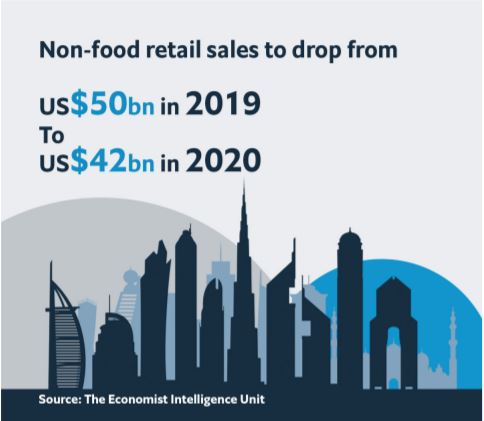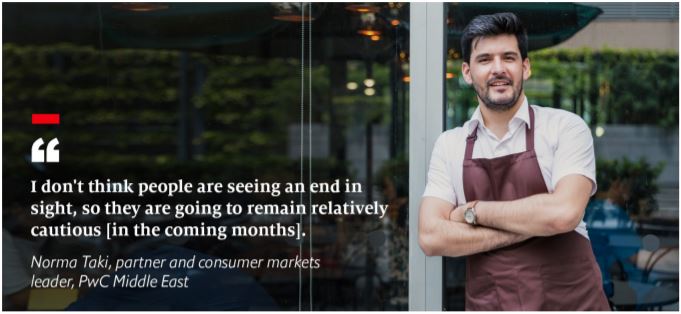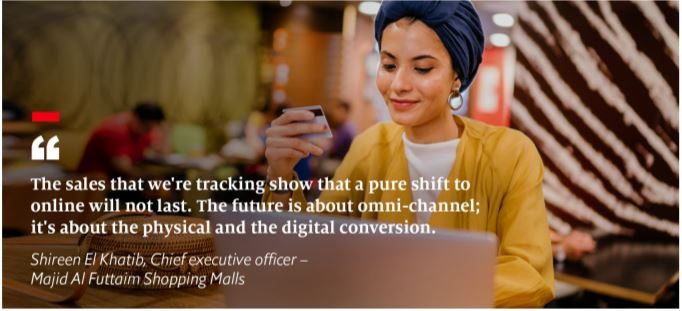The UAE’s retailers faced a quadruple blow as a result of the coronavirus restrictions: the temporary closure of non-essential shops at the start of lockdown, a fall in consumer confidence, loss of foreign tourists and a drop in resident numbers as expatriates left the country.
In Dubai, lockdown restrictions in April prohibited people from leaving their homes without police permission and only essential trips to obtain food or medicines were permitted. Non-essential shops and restaurants were closed until late April in Dubai and early May in the rest of the country. The fall in tourism resulting from national lockdowns has hit the UAE’s retail and hospitality sectors hard. Travel and tourism contributes roughly 12% to the UAE’s GDP.1 The Economist Intelligence Unit (EIU) predicts that retail sales of non-food items will drop to US$42bn in 2020 from US$50bn last year. Overall, the UAE economy—also hurting from an oil price slump—is forecast to shrink by 5.7% in 2020, according to the EIU.
This decline in economic activity has driven job losses across sectors. The UAE may experience peak-to-trough job losses of some 900,000, or 9% of its population, according to estimates by Oxford Economics.2 About 90% of the UAE’s population consists of expatriates, and many may have to return home if they lose their jobs, potentially weakening overall consumer demand.

It is not yet clear how many expatriates have left or are planning to leave, and this may depend on how quickly the economy recovers. Piyush Chowhan, chief information officer of LuLu Group International, a UAE-headquartered hypermarket chain, says that many more may leave once international travel becomes easier. The lack of data makes it difficult to assess the impact on overall consumer demand. Ultimately, an exodus of higher-paid expatriates will have a greater impact on the retail sector than a loss of lowerpaid expatriate workers, who send a large share of their wages home.3
With fewer tourists, retailers now have to think about how they can tailor their offerings to local residents. In addition to changes in overall consumer expenditure, retailers have to be mindful of changes in product demand composition and preferred shopping channels.
Assessing pent-up demand
Even though some international destinations are receiving flights, UAE residents—who typically go abroad to escape the heat of the summer months—have been reluctant to travel during the pandemic.4 They are consequently spending more locally, on “staycations” and visiting shopping malls, say interviewed experts.
But this surge, or “revenge spending” (defined as an increase in spending above prepandemic levels by consumers emerging from isolation), may be limited. Norma Taki, partner and consumer markets leader at PwC Middle East, explains that although people have not been able to spend as much as usual on travel or eating out during lockdown, it is hard to tell whether there is significant pent-up demand. In the face of a protracted pandemic and job insecurity, people are unlikely to rush to spend large amounts. “I don’t think people are seeing an end in sight, so they are going to remain relatively cautious [in the coming months],” she says.
LuLu Group, which mainly offers groceries and essential products, has not experienced a surge in sales due to pent-up demand but has observed a shift in spending to segments such as home office equipment and “value” items. Fashion and other discretionary items have seen much smaller sales volumes, down by 80% from pre-pandemic levels.5

Demand shifts are evident in other product categories too. One of these is health and wellness. Since the start of the pandemic, young people especially have become “very concerned” about healthy eating, exercise, and overall physical and mental wellbeing, says Ms Taki. As well as sales of sportswear and online exercise classes, there has been a recent rise in demand for local and organic produce. The pandemic has also strengthened demand for brands that have a social purpose— actively “giving back” to their employees, their customers, their community or the environment, notes Ms Taki.
The convenience factor: Online shopping
The pandemic has driven a shift not only in the composition of purchases but also in preferred retail channels. The UAE’s residents have been moving to online shopping for years because of its convenience, but the trend accelerated during lockdown, when it became the only option available for many products.
A PwC survey found that the proportion of people shopping for groceries online rose from 29% to 51% during lockdown.6 Over 90% of survey respondents said that they are likely to continue shopping on smartphones even after social distancing measures are lifted. “People have tasted the flavour of online,” with e-commerce platforms offering a huge variety of products, deals and discounts, as well as convenience, says Shireen El Khatib, chief executive officer at Majid Al Futtaim Shopping Malls. People have also increasingly turned to the internet for services like telemedicine and exercise classes, and some of these trends will stick, says Ms Taki.
The potential for e-commerce expansion in the UAE is high: nearly all of the UAE’s population of 9.5m7 have internet access,8 and smartphone penetration stands at 97%.9
Consumers who are waiting for a vaccine to return to stores may have to become more accepting of e-commerce and home deliveries.
Lockdown restrictions on shopping have thus forced businesses to expand their online presence. “We’ve offered online platforms for our [brands] to ensure that they have access to consumers,” observes Ms El Khatib.
Going “phygital”: The omni-channel offering
Despite the convenience of online shopping, some consumers are returning to shops now that restrictions have been eased. Footfall at LuLu Group’s supermarkets is back to pre-Covid levels, for example, although the company’s department stores have yet to catch up. Some of Majid Al Futtaim’s malls have seen in-store sales improve by 80% from their May-June levels, while their other malls have seen a recovery of about 40%. Clear communication by retailers on health and safety measures implemented has been an important factor in driving the return to in-person shopping, says Lulu Group’s Mr Chowhan. “Trust is what is bringing people back into the stores.”
Malls are an integral element of the UAE’s culture and offer activities, inspiration and human interaction that online shopping can never replace, states Ms El Khatib. “In the Middle East in general, going to a shopping mall is an outing for the family or the individual. It goes beyond shopping, for sure.” Nevertheless, malls must continue to refresh shoppers’ experiences and provide new and innovative offers to keep people coming back. During the summer, Majid Al Futtaim’s malls were offering summer camps and gaming spaces. “It brought in a lot of youngsters, activating our community hub again,” says Ms El Khatib.
Retailers must also try to replicate online the experience that they offer in store, as far as technology allows. As well as adding more retailers to its online platform, Majid Al Futtaim has launched a “phygital” pop-up store. Customers can browse the shop’s products through its own mobile app, trial them in store and purchase them either in the shop or online. “The sales that we’re tracking show that a pure shift to online will not last,” says Ms El Khatib. “The future is about omni-channel; it’s about the physical and the digital conversion.”
 Lessons from the pandemic
Lessons from the pandemic
The pandemic experience has shown that companies need to become more agile in order to adapt to sudden changes in consumer behaviour and must become more resilient in the face of any upsurge or drop in demand. This means that company processes have to be flexible enough to absorb shocks like the pandemic, says Mr Chowhan. Staff need to use more “design thinking”, a customer-centred iterative process for problem-solving and innovation. Part of this involves working closely with consumers to gain real-time insights into their behaviour and using suitable technology to support agile strategies.
The second major lesson is the need for more innovation to engage consumers. This refers not just to creative online delivery but to in-store experiences too. “Innovation is not a choice any more. You have to continuously innovate, you need to do things far better and far faster,” Mr Chowhan says. Ms El Khatib echoes this sentiment: “With the pandemic we realised that we definitely have to speed things up and rush into offering more facilities on our online platforms. [But just as is important is] experience, experience, experience—physical spaces are here to stay.” The ability to strike the right balance between online and in-store shopping experiences will determine which retailers succeed in the post-Covid era.
[1] World Travel and Tourism Council, Travel & Tourism – Global Economic Impact & Trends 2020, May 2020
[2]Oxford Economics, Global Macro Service, Research Briefings, Africa and Middle East. https://www.oxfordeconomics.com/my-oxford/ publications/561739
[3] Karen E Young, “Business as usual? UAE consumer spending post Covid-19”, AEI, June 2020. https://www.aei.org/articles/business-as-usual-uaeconsumer-spending-post-covid-19/
[4] Zafar Shah, “UAE residents hesitant to travel due to Coronavirus, but likely to do so if the trip is incentivised”, YouGov, August 2020. https://mena.yougov.com/en/news/2020/08/21/uae-residents-hesitant-travel-due-coronavirus-like/
[5]EIU to confirm with Lulu Group
[6] “How resilient Middle East consumers have responded to Covid-19”, PwC, 2020. https://www.pwc.com/m1/en/publications/images-new/gcis-2020/ how-resilient-middle-east-consumers-have-responded-covid-19.pdf
[7] World Bank. https://data.worldbank.org/country/united-arab-emirates
[8] Ibid. https://data.worldbank.org/indicator/IT.NET.USER.ZS?locations=AE
[9] Deloitte, Mobile consumption in a post-growth world, Deloitte Global Mobile Consumer Survey, Middle East Edition, 2019. https://www2.deloitte. com/content/dam/Deloitte/xe/Documents/technology-media-telecommunications/GMCS-whitepaper.pdf






